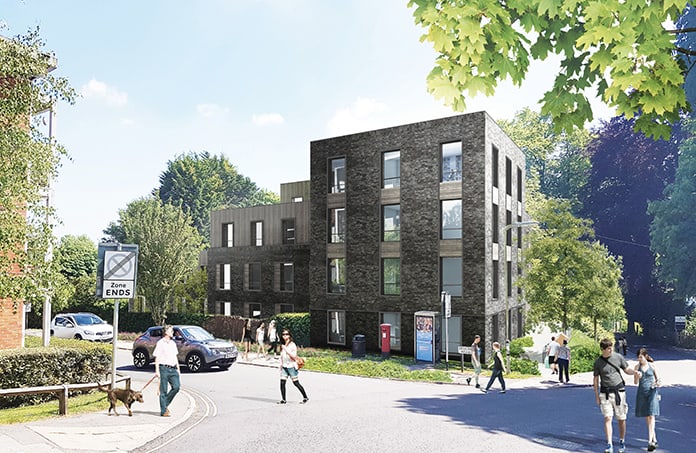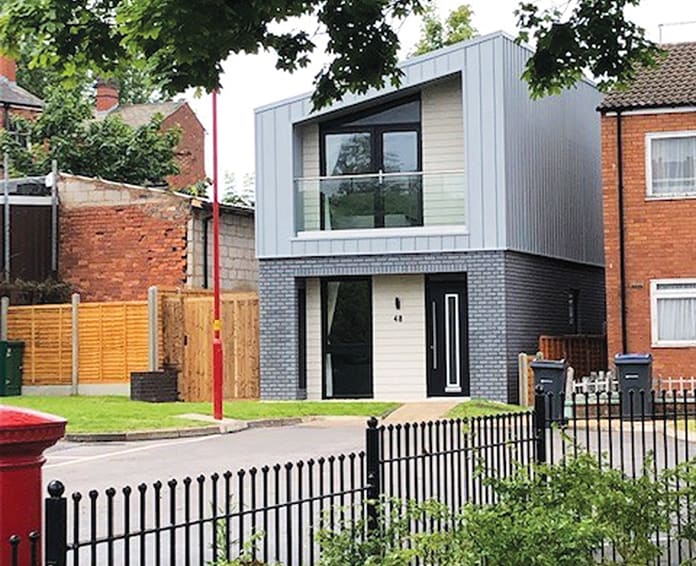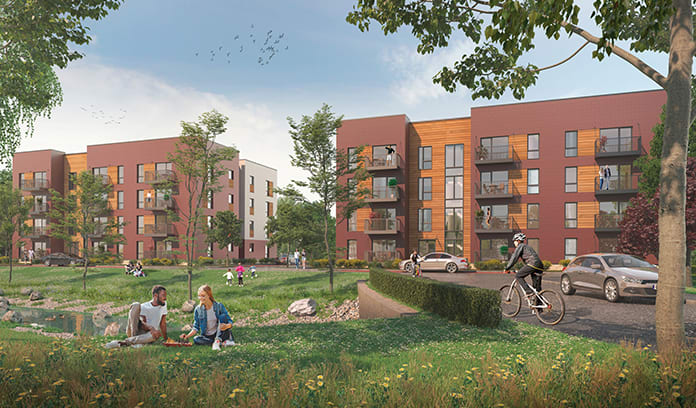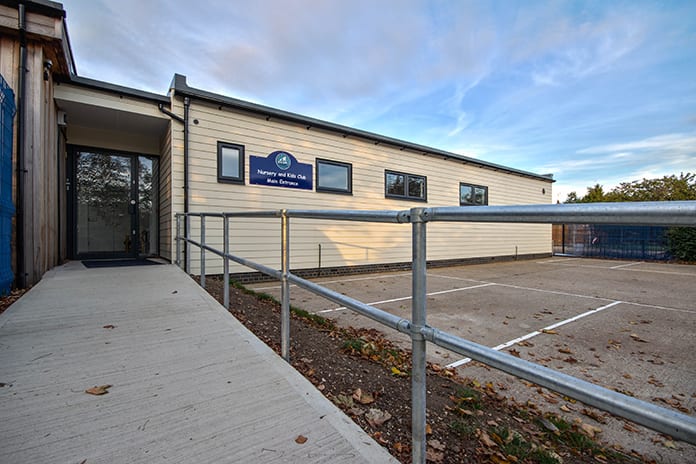With government backing and growing investor interest in the offsite sector, new players are flooding into the market. Denise Chevin talks to some of the newcomers about their strategies.
The march of modern methods of construction continues apace. Government policy, the need for more homes of improved quality, and growing confidence in factory-made systems have led to some headline-making deals.
These tie-ups – most significantly, between Homes England, Urban Splash and the Japanese housing giant Sekisui – have boosted the view that offsite is a force to be reckoned with.
Yet as MMC gains real momentum, there are questions over whether these ventures are sustainable? Is this another false dawn and will MMC again end up being sunk by unpredictable demand and lack of pipeline? And what strategies are there to manage this risk?
“There are a lot of competing and conflicting signals, but I would say it’s different this time around – it feels as if it will stick. But that said, it will end in tears for some,” says Mark Farmer, CEO of consultancy Cast.
Jeff Maxted, technical director of consultancy with BLP, which provides the BOPAS accreditation for modern methods of construction, attests to the boosted market activity. He says that 40 schemes have been BOPAS accredited, and that he expects this number to rise to 100 by the end of the year. The majority are modular of one form or another and UK based.
“We are well past the tipping point,” he says. “I would expect offsite in all its different forms to take 20% of the house building market in the next five years.”
For Farmer, the fundamental challenge of a visible pipeline is still there, but this is reduced, he says, because some of the new entrants are vertically integrated. By this he means that they manufacture for their own development pipelines. Alternatively, they are partnering with housing associations or councils, which either have land or funding, or both.
And it helps to have institutional investors with deep pockets, again an emerging trend. Developer and manufacturer TopHat, for example, revealed in May it had secured a £75m investment from Goldman Sachs.
Meanwhile, Ilke Homes announced in June that it was partnering with Places for People, one of Britain’s biggest housing associations. In a pioneering £100m joint venture, Places for People will purchase 750 units from Ilke Homes, including 500 for sites it already owns.
Elsewhere, affordable developer BoKlok, which is co-owned by Ikea and Skanska, has signed a deal with Worthing council in West Sussex to build 162 apartments on land it owns (see below).
Farmer says the most significant development is the arrival of Sekisui, Japan’s biggest housebuilder. In a deal announced in May, £55m will be invested into regeneration company Urban Splash’s offsite development business. Sekisui is investing £22m, with £30m of equity and debt funding coming from the government’s Home Building Fund, administered through Homes England.
“I wouldn’t underestimate the deal: it brings world-leading technology,” Farmer says. He expects other Japanese firms to follow, attracted because government has made it clear it wants to use offsite to help solve the housing crisis. “UK modular companies have got to fight for the market – they need a good idea and good quality,” he adds – and that means advanced manufacture rather than simply building traditionally in a shed.
But even with money to invest in state-of-the-art factories, launching a modular housebuilding business is not easy. L&G’s £55m modular homes factory near Leeds, with a capacity to build 3,500 homes a year, has so far seen a trickle of homes coming off the production line since its 2016 launch. L&G says it is taking a considered approach.
There are also ongoing issues around warranties and mortgage providers. A government-backed task force chaired by Farmer to get the leading companies to agree a standard approach to certification of offsite systems is currently in the doldrums. The fallout from Grenfell, which has left some warranty lenders exposed, has led to increased nervousness.
“I’m conscious people are waiting for an update, but I can’t report any progress at the moment,” says Farmer.
Stelling Properties pioneers DfMA
Hampshire developer’s high-tech factory can manufacture 600 beds a year.

One of the newest vertically integrated developers is Stelling Properties in Hampshire, which was born out of student accommodation management company Unilife.
Set up at the start of 2018, Stelling opened a factory six months later in Micheldever and installed the first modules in May 2019 for student housing for the University of Winchester. The project of 92 studio dwellings over four storeys (above) is to complete this month.
Construction has just started on 82 studios for students at nearby Surrey University in Guildford and there are plans for a 97-bedroom hotel in Southampton.
Managing director Tom Eshelby, who is also chair of the residential hub at Buildoffsite, says the original plan was to contract with a modular supplier, but that as the quality and level of service was “poor”, they decided to do it themselves.
Stelling invested in a high-tech factory, which can be scaled up to manufacture 600 beds a year, for hotels, student accommodation or private residential. It will buy the land or partner with local authorities, which he says is key.
Modules, manufactured with hot-rolled steel frame, arrive on site fully fitted out. Stelling uses a construction management company to oversee the process and package up specialist activities like groundworks. The modules are designed in BIM which is then used as a template for the manufacture.
“Offsite construction lends itself to digitalisation,” says Eshelby. “I do think we’ve overcome that cottage industry perception. Homes England is positively encouraging MMC, and traditional housebuilders are finally getting to grips with it. Slowly but surely it is slipping into the mainstream.
“The political will is there. What’s waiting to happen is the making of a supply chain. Certainly, in terms of DfMA, architects need to catch up.”
ModPods offer solution for Brum’s tricky sites
Just Solutions’ steel modules are craned in where access is a problem.

The Coventry-based general building firm Just Solutions has set up a new modular housing operation, which has developed a product for Birmingham Mutual Housing Trust (BMHT), the housebuilding company owned by Birmingham City Council.
The city got its first “ModPod” (pictured) in June this year when the insulated lightweight steel modules, complete with furniture, were craned into to place in an hour and the tenant moved in the same afternoon.
The two-bedroom two-storey house was built for £100,000 – 40% cheaper than traditional means, says Andy Cornaby, director of business development at Just Solutions.
One of its benefits is that the BOPAS-accredited housing units can be erected on problematic brownfield sites, where access can be a problem. Birmingham has over 1,000 such sites and needs to harness their potential to help build a planned 84,000 new homes in 20 years.
BMHT has council approval to build a further 57 ModPods across six sites during the next 12 months, and then has a procurement programme for 500 units a year after that up to 2025. Cornaby says it is looking for a large factory in the Midlands to step up production, should it secure the larger rollout contract.
He says that the firm is also in talks with a plethora of other affordable housing providers – and also private housebuilders – and if similar deals are struck it plans pop‑up manufacturing hubs to get local people into the workplace.
Swedish expertise comes to the UK
Housing specialist owned by Ikea and Skanska plans to adapt its model for the UK market.

BoKlok, the modular housing specialist jointly owned by Ikea and Skanska, has been building homes since the mid-1990s. In that time it has built 11,000 in Sweden, Norway, Finland and Denmark – now averaging around 1,200 a year.
It is now bringing its formula for low-cost home ownership to the UK and is targeting its development at the key worker market – typically building two-bedroom 70 sq m apartments that will be affordable for couples with a joint income of around £53,000 a year.
The plan is to develop on sites in the area around Bristol and Cheltenham and also between Southampton and Brighton – where the model is viable for low-density housing on leafy sites.
Graeme Culliton, UK managing director of BoKlok, who is based at Skanska’s head office in Hertfordshire, says that the system is currently going through the BOPAS accreditation process, which it expects to complete by the end of the year, with the first homes for sale in early 2021.
Culliton says that, as well as delivering to a high quality of design and construction, what will mark out BoKlok is the level of service that will come as part of the buying process. It intends to harness social media to sell homes and involve purchasers in the construction process.
The timber-framed units are 99% completed when they arrive on site and a number of homes can be built in a day. Initially the homes will be manufactured at BoKlok’s fully automated factory in the Baltic – to a design that has been adapted to the UK market. Once demand has increased, the company may look to manufacture under licence in the UK.
It is aiming for each development to have between 40 and 150 homes. Culliton won’t put a figure on output for the UK market.
“It will be dictated by the availability of land, and there are two routes to that – local authorities and the public sector. Homes England have been really supportive in match making, and we’re bidding in the open market at well,” he says.
Another USP that BoKlok brings to the market is that it will discuss with local authorities about their housing needs and adopt its development programme to suit. Lower developers’ profit and fees is another attraction.
“A number of local authorities have really embraced what we’re trying to achieve,” Culliton says, though he doesn’t want to comment on the company’s widely reported deal with Worthing (pictured above) until it has been signed.
Coming with the Ikea name attached, Culliton is keen to emphasise that BoKlok is not selling to the public, or acting as a contractor. It is a vertically integrated developer, aiming to bring new ideas to the market.
“If we are going to meet the levels of demand in the UK, we have to be inventive and create different routes,” Culliton adds.
Global ambitions for Project Etopia
Disruptor is aiming high.

One of the new breed of entrepreneurs hoping to disrupt the housing market is Joseph Daniels, CEO at Project Etopia. He is backed by hedge fund boss and former Conservative party treasurer Lord Fink, who has made a multi-million-pound investment.
It takes Project Etopia four weeks to construct a home using its novel panel-building system. It has also completed a turnkey smart school system using its highly insulated panels with Mitie at Brightlingsea in Essex (pictured).
It has two factories: one in Tiverton, Devon, which can expand to 400 homes a year, and a new one in Ellesmere Port, Cheshire, with capacity for 2,000 – “although we have ambitions to grow capacity to 6,000 homes a year,” says Daniels.
Project Etopia claims to be the only modular homes specialist in Britain which can create turnkey properties that combine passive design, affordability, renewable energy generation, intelligent heating and cooling systems, and smart home technology.
A demonstration house is being built at BRE’s Watford Innovation Park and it recently completed the first eco-houses on a 47-home modular commuter village in Corby, Northamptonshire.
Daniels has global ambitions, and is in talks to sell his product in India, Pakistan, Namibia, UK and California.













